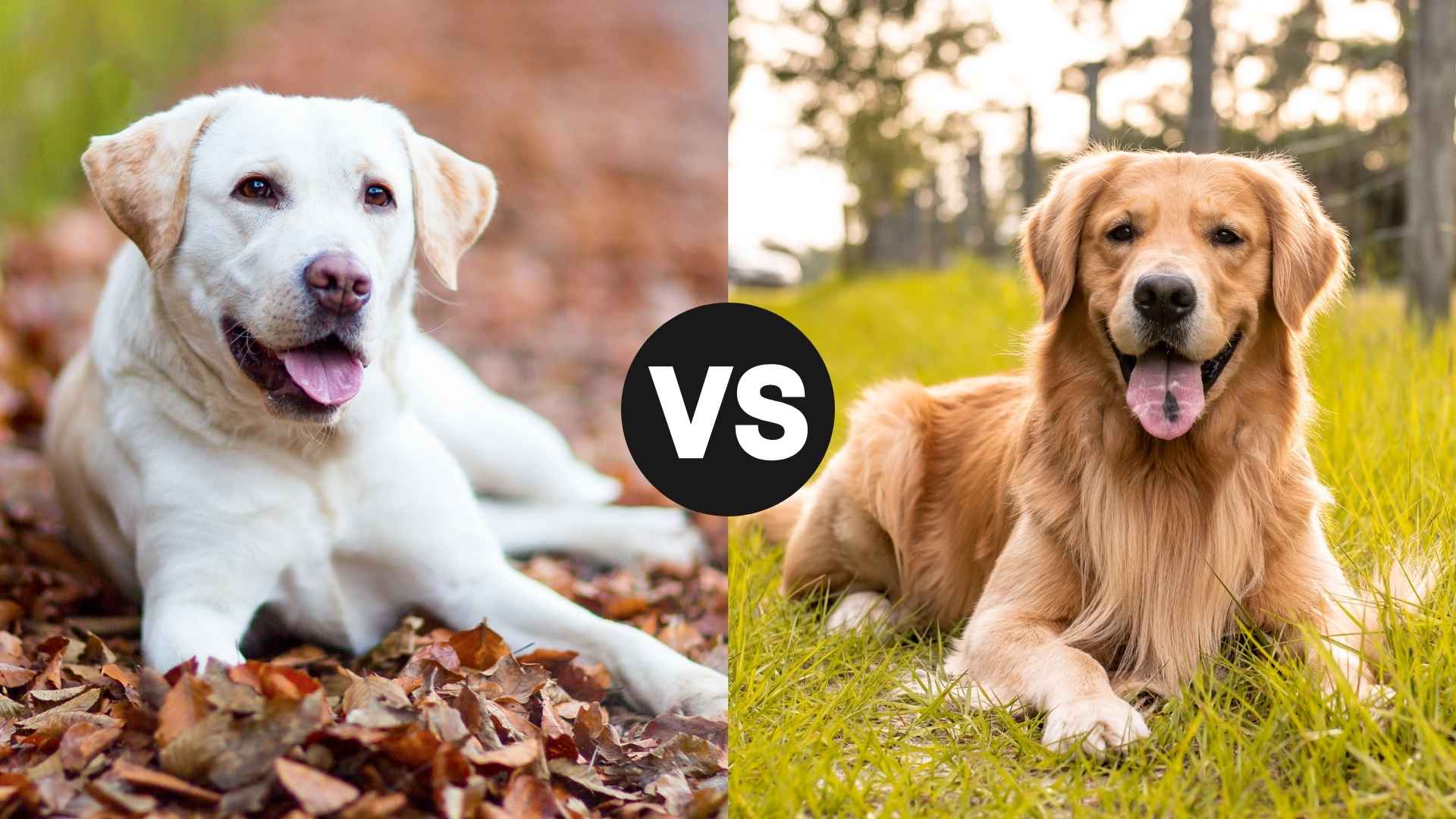Labrador Retrievers and Golden Retrievers—two of the most lovable, family-friendly dogs out there—often leave people wondering: Which one is better? The truth? They’re both incredible, but they have some key differences that might make one a better fit for your lifestyle.
Labs are all about energy, play, and adventure. They’re the kind of dog that will sprint after a ball a hundred times and still want more. Goldens, on the other hand, are a bit more easygoing. They’re affectionate, gentle, and always ready for snuggles—but don’t underestimate their playful side!
From their coats to their temperaments, training styles, and even their exercise needs, these two breeds have their own quirks. Whether you want a high-energy workout buddy or a fluffy cuddle companion, choosing between a Lab and a Golden is all about what fits your vibe.
Let’s break it down!
Labrador Retriever vs. Golden Retriever
Labs and Golds: Key Differences
Labrador Retrievers and Golden Retrievers may look similar, but some key differences set them apart. Labs are generally more energetic, muscular, and a bit more independent, making them great for active owners who love outdoor adventures.
Goldens, conversely, are more affectionate, people-pleasing, and gentle, often thriving in therapy or family settings. Coat care is another big difference—Labs have a short, dense coat that’s easy to maintain, while Goldens have long, flowing fur that requires regular brushing to prevent matting. Regarding training, Labs can be a little stubborn but are highly food-motivated, while Goldens are eager to please and pick up commands quickly.
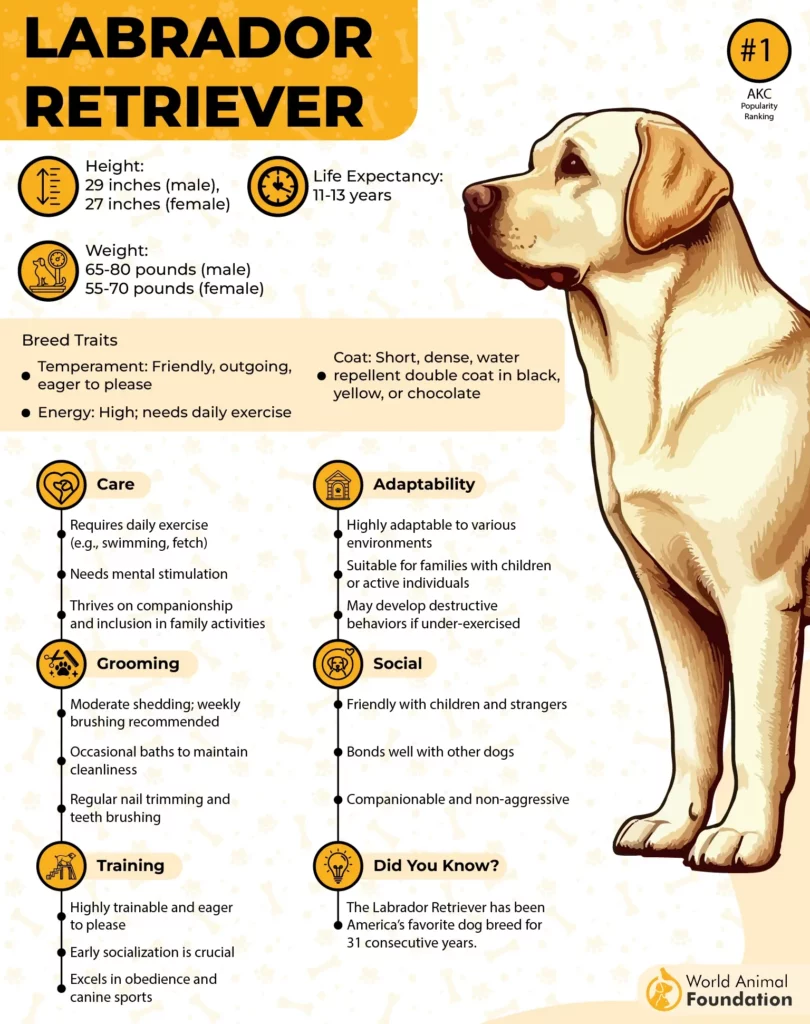
Both breeds are incredibly loyal and loving, but your choice depends on your lifestyle—need a high-energy workout buddy? Go for a Lab. Want a fluffball to cuddle? A Golden might be your perfect match!
Here’s a quick comparison of Labrador Retrievers and Golden Retrievers:
|
Feature |
Labrador Retriever |
Golden Retriever |
|---|---|---|
|
Energy Level |
High, always ready to play |
Active but slightly calmer |
|
Temperament |
Outgoing, independent, adventurous |
Gentle, affectionate, eager to please |
|
Coat Type |
Short, dense, water-resistant |
Long, wavy, and requires regular grooming |
|
Shedding |
Moderate to heavy |
Heavy, needs frequent brushing |
|
Trainability |
Intelligent but can be stubborn |
Highly trainable, quick learner |
|
Best For |
Active owners, outdoor lovers, hunters |
Families, therapy work, affectionate companionship |
|
Social Nature |
Friendly but can be boisterous |
Naturally social and loving |
|
Lifespan |
10-12 years |
10-12 years |
Labrador Retriever vs. Golden Retriever: Personality and Temperament
When it comes to personality, both Labs and Goldens are total sweethearts, but they bring their own unique vibes. Labs are high-energy, playful, and always up for an adventure, while Goldens are gentle, people-pleasers, and affectionate dogs. Whether you want a goofy, high-energy workout buddy or a softhearted snuggle canine companion, there’s a breed for you!
Labrador Retriever: Personality and Temperament
Labs are like the life of the party—enthusiastic, outgoing, and full of energy. According to PetMD, they love to play, explore, and be involved in everything you do. Need a jogging partner or a hiking buddy? A Lab is always ready!
They’re also independent thinkers, which means they might push boundaries, especially if they get bored. Ever had a Lab stare at you with that mischievous look before stealing your sock? Yep, that’s their playful nature in action.
Super friendly – They adore people and other pets.
Endlessly energetic – Perfect for active owners.
Strong retrieving instinct – Will chase a ball for hours!
Labs are smart dogs, but they can be stubborn if they don’t see the point in something. That’s why they thrive with positive reinforcement training (and lots of treats). They’re incredibly loyal and devoted, making them fantastic family dogs—just be ready for some zoomies around the house!
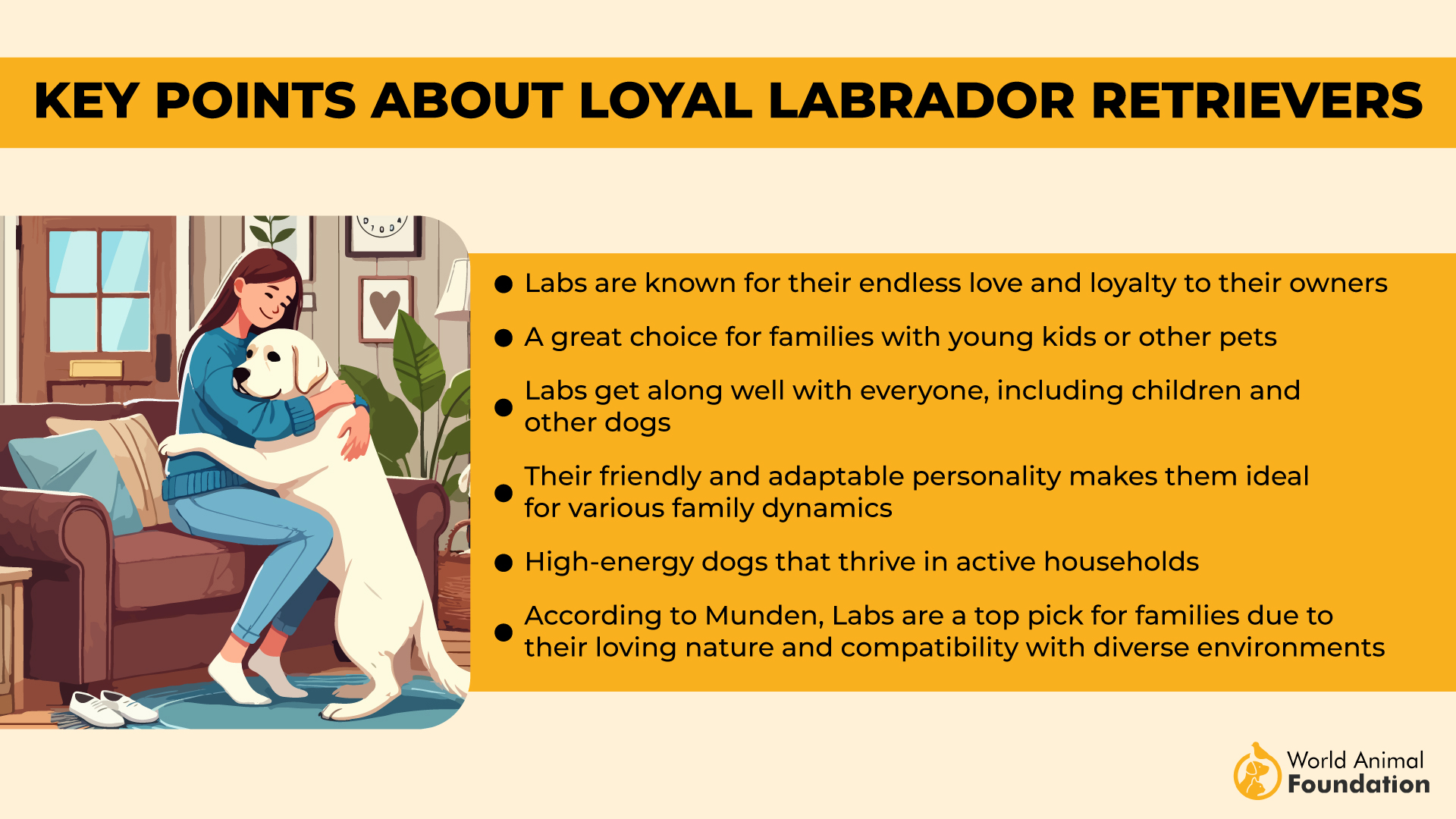
Golden Retriever: Personality and Temperament
Goldens are the ultimate affectionate, gentle dogs, states Purina. They’re social butterflies who thrive on human interaction and always seem to have a happy, wagging tail. Unlike Labs, who can be a little independent, Goldens are all about pleasing their owners—which is why they excel as therapy and service dogs.

Deeply affectionate – They love cuddles and human connection.
Highly trainable – They live to make you happy!
Softer temperament – Great for families and therapy work.
While Labs are all about rough-and-tumble play, Goldens have a calmer, more sensitive side. They’re still active and playful, but they’re also more emotionally attuned to their owners. Feeling down? A Golden will sense it and nuzzle up to comfort you. But don’t be fooled by their soft side—these dogs love a good game of fetch just as much as Labs!
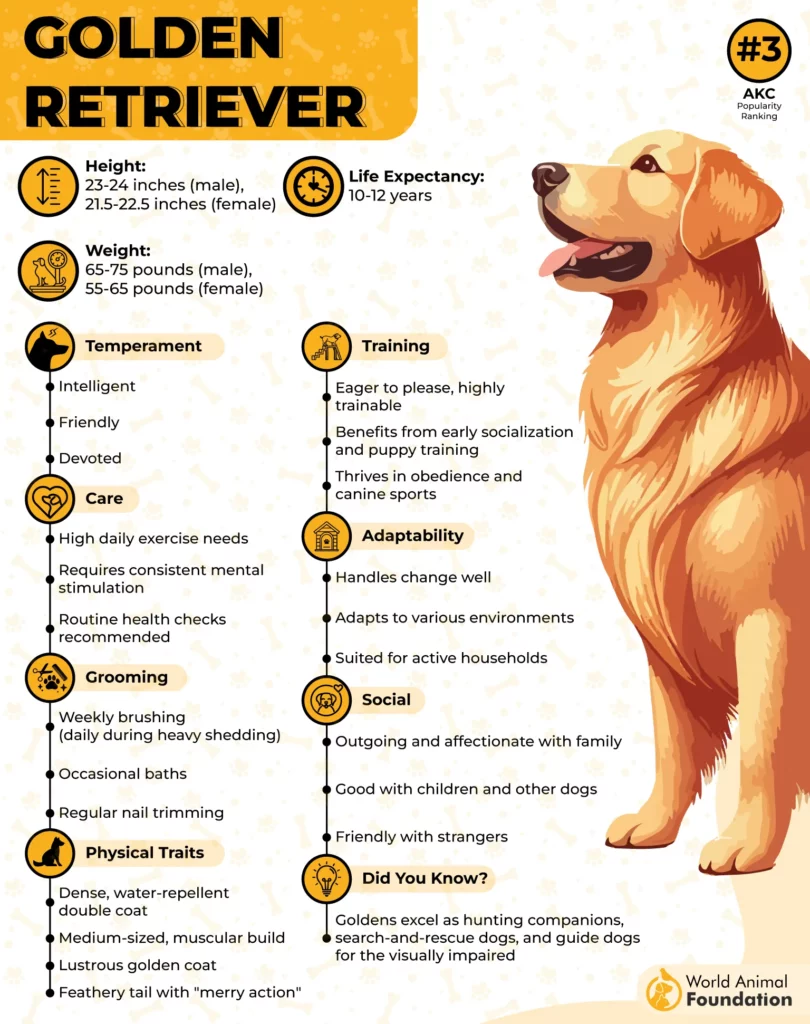
Both breeds are amazing, but their personalities cater to different lifestyles. Want an energetic, fun-loving goofball? Go for a Lab. Looking for a gentle, affectionate best friend? A Golden is your match!
Labrador Retriever vs. Golden Retriever: Intelligence and Trainability
Both Labrador Retrievers and Golden Retrievers are highly intelligent breeds, ranking among the smartest dogs in the world. But when it comes to training, they have slightly different learning styles. Labs are quick learners but a bit stubborn, while Goldens are eager to please and thrive on praise.
If you’re looking for a dog that picks up commands easily, you can’t go wrong with either—but knowing their differences can help you train them more effectively!
Labrador Retriever: Intelligence and Trainability
Labs are incredibly smart and intelligent, states Petplan. They also have a streak of independence. They learn commands fast—especially when food is involved—but they can get distracted if they’re excited or see something interesting (like a squirrel or a tennis ball). Because of their high energy and curiosity, Labs need consistent training and mental stimulation to stay focused.

Highly food-motivated – Want them to listen? Bring treats!
Eager to learn but easily distracted – Keep training sessions short and engaging.
Independent thinkers – May test boundaries if not properly trained.
Training a Lab is all about patience and positive reinforcement. If you make training sessions fun and rewarding, they’ll pick up commands quickly. Just be prepared for their playful side—they might steal a shoe mid-session just to get your attention!
Golden Retriever: Intelligence and Trainability
Goldens are natural people pleasers, which makes training them a breeze. They’re highly responsive to verbal praise, affection, and rewards, and they love working alongside their owners. This is why they’re often chosen as therapy, service, and guide dogs—they genuinely want to learn and make you happy.
Extremely eager to please – Training feels like a game to them.
Sensitive and intuitive – Respond best to gentle correction.
Quick learners – They master new commands faster than most breeds.
Unlike Labs, who sometimes push limits, Goldens are more cooperative and thrive on structure. If you use positive reinforcement and a gentle approach, and deliver a physical or verbal prompt for a behavior, states PetMD. They’ll pick up on commands almost instantly. Just don’t be too harsh—Goldens are sensitive dogs who may shut down if they feel scolded.

Both breeds are exceptionally trainable, but their personalities affect how they learn. Labs are high-energy and sometimes stubborn, requiring structured training with rewards. On the other hand, Goldens are so eager to please that they practically train themselves—as long as they feel encouraged.
So, if you want a dog that’s easy to train and thrives on praise? Go with a Golden. If you’re up for a fun challenge with an energetic, food-loving student? A Lab will keep you on your toes!
Labrador Retriever vs. Golden Retriever: Grooming and Care Needs
When it comes to grooming, there’s a big difference between Labs and Goldens. Labs are low-maintenance dogs, while Goldens require more effort to keep their gorgeous coats tangle-free. A Golden’s luxurious fur is worth the effort if you don’t mind regular brushing. But if you want a wash-and-go type of dog, a Lab might be a better fit!
Labrador Retriever: Grooming and Care Needs
Labs have short, dense double coats, states PetMD. While they don’t need as much brushing as Goldens, expect plenty of fur on your clothes and furniture!

Brushing: 1-2 times a week to remove loose hair and control shedding.
Bathing: Every 4-6 weeks or when dirty (Labs love rolling in mud!).
Shedding: Moderate to heavy, especially in spring and fall.
Ear care: Regular cleaning is a must—Labs are prone to ear infections.
Since Labs have a natural oil in their coats that repels water and dirt, frequent baths can strip their skin of essential oils. Instead, a good wipe-down and occasional brushing will keep them looking fresh.
Golden Retriever: Grooming and Care Needs
Goldens have long, wavy double coats that require much more maintenance than a Lab’s. According to AKC, this Breed is a sturdy, muscular dog of medium size. Their feathery fur is prone to tangling and matting, especially behind the ears, on the chest, and around the tail.

Brushing: 3-5 times a week (daily during shedding seasons).
Bathing: Every 4-6 weeks, but more often if they get dirty.
Shedding: Heavy—be prepared for golden fluff everywhere!
Ear and paw care: Trim fur around paws and clean ears to prevent infections.
Unlike Labs, Goldens’ coats can trap dirt and debris, making regular brushing essential. If left unattended, their fur can mat, leading to skin issues. A de-shedding tool and slicker brush are must-haves for Golden owners!
If you prefer low-maintenance grooming, Labs are the way to go. But if you don’t mind extra brushing and some hair tumbleweeds, a Golden’s stunning coat is well worth the effort. Either way, both breeds shed a lot—so be prepared to vacuum often, no matter your choice!
Labrador Retriever vs. Golden Retriever: Health Concerns and Lifespan
Both Labrador Retrievers and Golden Retrievers are generally healthy breeds, but they do have their fair share of genetic health concerns. While Labs tend to face joint and weight-related issues, Goldens are unfortunately more prone to cancer. Understanding these risks can help you take better care of your furry friend and ensure they live a long, happy life!
Labrador Retriever: Health Concerns and Lifespan
Labs are strong, energetic dogs, says AKC. They can struggle with certain health issues, especially if they don’t get enough exercise or have an unbalanced diet. Their love for food can lead to obesity, which puts extra strain on their joints and overall health.
Hip & elbow dysplasia – Common in large breeds; can lead to arthritis.
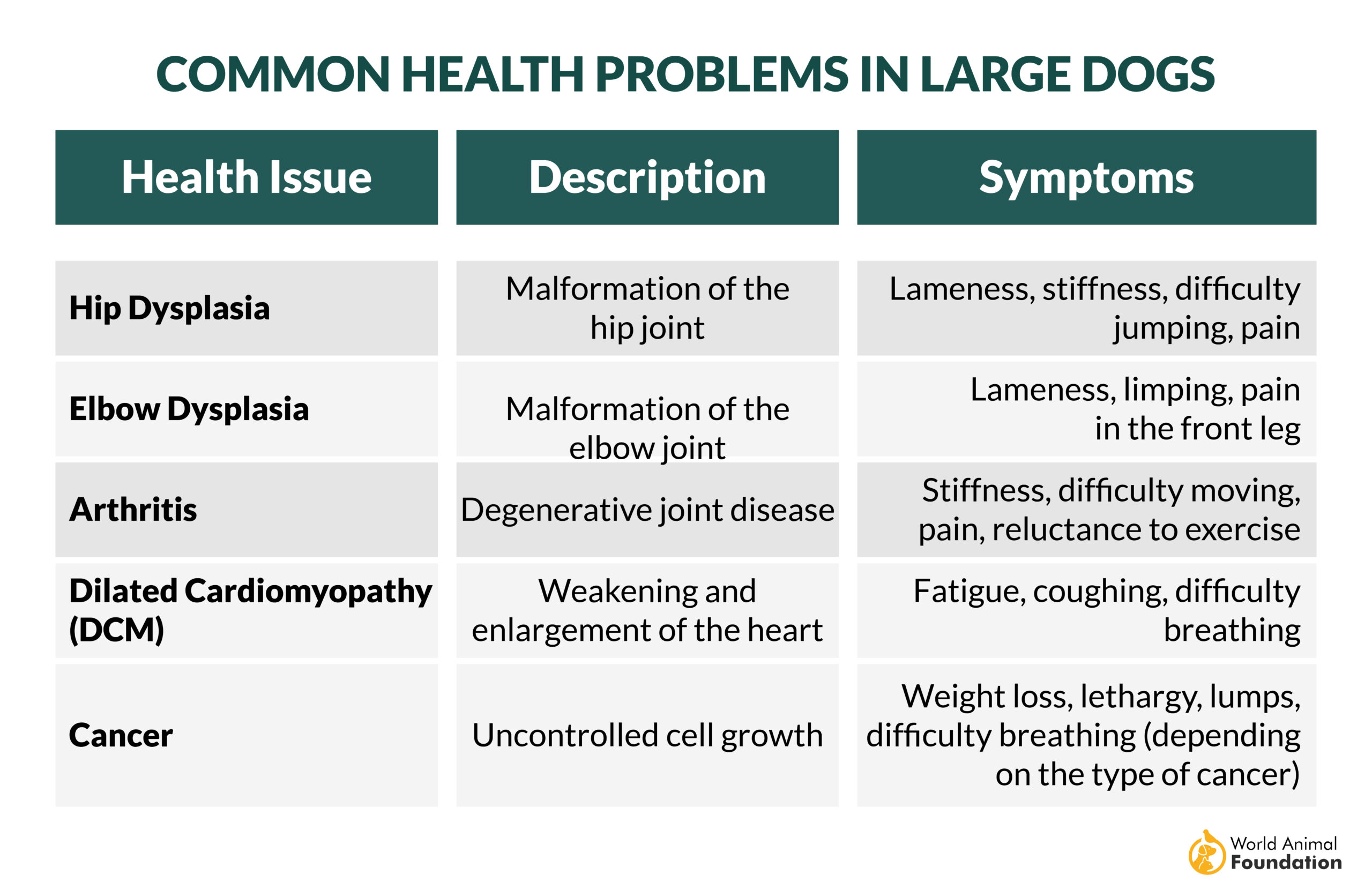
Obesity – Labs are food lovers, so portion control is key!
Ear infections – Their floppy ears trap moisture, making infections common.
Exercise-induced collapse (EIC) – A genetic condition that causes weakness after intense activity.
Life span: 10-12 years. Labs can live active, healthy lives well into their senior years with proper diet and exercise!
Golden Retriever: Health Concerns and Lifespan
Goldens are prone to several serious health issues, with cancer being one of the biggest concerns. They also suffer from joint and heart problems, making regular checkups crucial. Despite their health risks, Goldens are incredibly resilient and affectionate dogs that bring joy to their owners for many years.

Cancer – Unfortunately, Goldens have a high risk of developing lymphoma and hemangiosarcoma.
Hip & elbow dysplasia – Just like Labs, joint problems are common, says Purina.
Heart disease – Some Goldens are prone to subvalvular aortic stenosis (SAS), a heart condition.
Skin allergies – Their thick coats can trap allergens, leading to skin issues.
Lifespan: 10-12 years. While cancer is a major concern, early detection and a healthy lifestyle can help extend their lifespan.
Both breeds have similar lifespans and share common issues like hip dysplasia, but Goldens are at a higher risk for cancer, while Labs struggle more with obesity and joint stress. Keeping your pup active, feeding them a balanced diet, and scheduling regular vet checkups can help them live a long, healthy life!
Conclusion
When comparing the Labrador Retriever vs. Golden Retriever, it’s clear why both are among the most popular dog breeds. These beloved breeds share a long history as hunting retrievers, originally bred to retrieve game birds from cold water. The Labrador Retriever, descended from St. John’s Water Dog, is known for its shorter coat, high energy, and versatility, while the Golden Retriever boasts longer coats, a more laid-back demeanor, and a soft-mouthed retrieving ability.
Both are highly trainable, making them favorites among dog owners who want intelligent and eager-to-please companions. Dog lovers often debate the differences, but whether you prefer the golden retriever vs. labrador retriever, you can’t go wrong! While both are double-coated breeds, their grooming needs vary. Goldens require regular brushing due to their longer coats, while Labs tend to shed less but still need care.
If you want a dog with a more low-maintenance coat, a Labrador Retriever might be ideal. Goldens and Labs also differ slightly in physique—goldens tend to have deeper chests, while labs tend to be more muscular. When it comes to personality, retrievers are known for their affectionate and friendly nature, making them excellent pets for children and families. Both breeds need long walks, mental stimulation, and early training to thrive. Whether you’re considering a puppy or an adult rescue, both breeds will bring unconditional love into your home.


